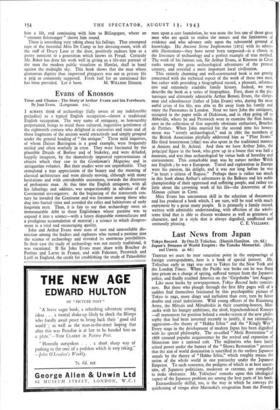Apology for an Actor
John Philip Kemble By Herschel Baker. (Milford. 225. 6d.)
SINCE his art dies with him, what is it in an actor that lives? Something does. Otherwise why should any number of people still prolong the Kean versus Kemble dispute? In answer to the modern lives of Kean, Mr. Baker writes a biography of Kemble, and if we cannot stir ourselves about ourselves in literature or drama we cannot smother old ardours our fathers left burning.
This one is a good one. Kemble was great enough (vain to question it) to be attacked. What he had achieved could not be talked out of existence when the universal earthquake shook every- body's ideas about everything. Acting is so small a part of the universe that so far it has not been related to that earthquake. But of course it was. John Philip was decried, no matter what reasons were given, because he had belonged to the old order. Kean was praised because he was the spirit of the new. And until a biographer realises why one actor cannot be understood without the other these " lives " will not be wholly satisfying.
The mistake has been to over-stress how opposite they were. The contrast is so startling that critics have overlooked its complementary nature. In the parts where Kemble failed Kean succeeded. The sense of conquest in that springs from our slavish obedience to clock and calendar. In the parts where Kean was to fail Kemble succeeded. Reason accepts this as equally final, although the he- who-laughs-last applause is lacking. The romantic tradition is now as dead as the classic. We can be impartial when we stop being sentimental.
In Mr. Baker's words, Kemble " more than any other first-rate figure in the annals of the English stage has suffered a curious loss of prestige at the hands of posterity." Cub actors will tell you with complete assurance that the great John Philip was not great. A characteristic modern comment on Kemble is that he acted as if "encased in armour." What impudence! Ours to reason why—not to pass judgement. Future generations may not reverse the ruling on an actor : nor may playgoers who saw him after his prime. It is absurd that such a simple statement as this needs making. More, it needs thrusting down some young critics' throats. We quote all that was ill said of Kemble and all that was well said of Kean while comparing them. Yet Hazlitt said many harsh things of Kean.
Even a mathematician who has never entered a theatre must see the fascination of this debate. The trouble is it needs a book, not a review. With space at his disposal Mr. Baker has not thought the opportunity worth seizing because he takes the orthodox view of a biographer's duty. He does seem a little too wary of special pleading. Where a counterblast would have been excusable he writes an apologia which is somewhat too apologetic. Why not trounce the detractors? Why not, with all this excellent material, sturdily vindicate greatness. Nothing can be proved against John Philip except that the times changed in his lifetime as never before.
Was he a bore? Aren't we all? If it is a question of degree could Kemble have held a candle to Kean? In their cups the contrast is unexpected. While the genius of romance was drab, dirty and without a stitch of humour, the classic genius was " utterly and mischievously ungovernable." Mr. Baker's tales make you laugh, and not uncharitably. Here is the great John Philip, as an inter- minable guest,. punctuating his discourse with " I see this is the last time I shall be invited to this house, so now I will make the most of it." Here he is hitch-hiking after an all-night party at Dr. Burney's, taking a fancy to the driver of a fish waggon who gives him a lift, and continuing with him to Billingsgate, where an " eminent fishmonger " shows him round.
There is something very taking about his failings. That attempted rape of the beautiful Miss De Camp in her dressing-room, with all the staff of Drury Lane at the door, positively endears him as a pretty innocent to a generation which knows its Freud. Certainly Mr. Baker has done his work well in giving us a life-size portrait of the man the modern public visualises as Hamlet, skull in hand against the midnight sky. This book shows that the man whose glamorous dignity thus impressed playgoers was not in private life a prig as commonly supposed. Fresh fuel for an unrationed fire























 Previous page
Previous page